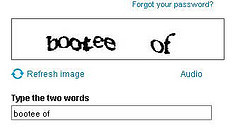Ticketmaster Ditching Captcha So You Won’t Have To Decipher “Spraklof Gurstung” Anymore
The glow of the computer screen flickers against a slumped, exhausted form. If you listen carefully, you can hear, “But… I… am… a… human…” It’s called Captcha Fatigue and if you’ve ever used Ticketmaster you might have felt like the entire system is gamed to result in the most frustrating, unintelligible bits of smushed together letters, designed to keep you from purchasing anything. And now it’s going away.
Well, it’s not going away forever but at least Ticketmaster has decided the system isn’t worth keeping. Captcha Fatigue might be a made up condition but we’re sure plenty of other frustrated customers have keyed in nonsensical phrases, only to be told it’s not correct, you’re a robot. But you’re not a robot.
BBC News says Ticketmaster is shifting to a simpler system where users will be asked to type actual phrases that make sense, like “freezing temperatures” instead of “tormentis harlory.” Pardon while I look that one up.
Captcha stands for Completely Automated Public Turing test to tell Computers and Humans Apart, and since it was first developed in 2000, it’s had to get wily to discourage robots from trying to buy a large number of tickets. Those advances mean it’s become more and more annoying and frustrating.
Indeed, anytime I’m faced with a Captcha I take four deep breaths and resign myself to entering at least two different phrases, if not more. The new software used by Ticketmaster will also use multiple choice questions along with well-known phrases, and it seems to be doing the job.
“We’re starting to see an uptick in fan satisfaction,” said Kip Levin, Ticketmaster’s executive vice president of eCommerce. “We’re happy with what we’ve seen from a security standpoint as well.”
Relief is in sight, everyone. Sweet, sweet Captcha relief.
Ticketmaster dumps ‘hated’ Captcha verification system [BBC News]
Want more consumer news? Visit our parent organization, Consumer Reports, for the latest on scams, recalls, and other consumer issues.


